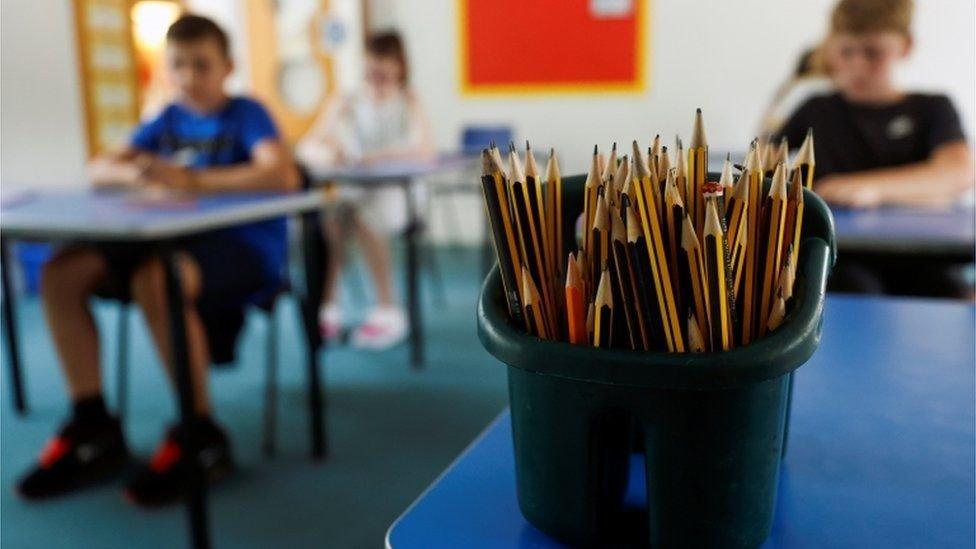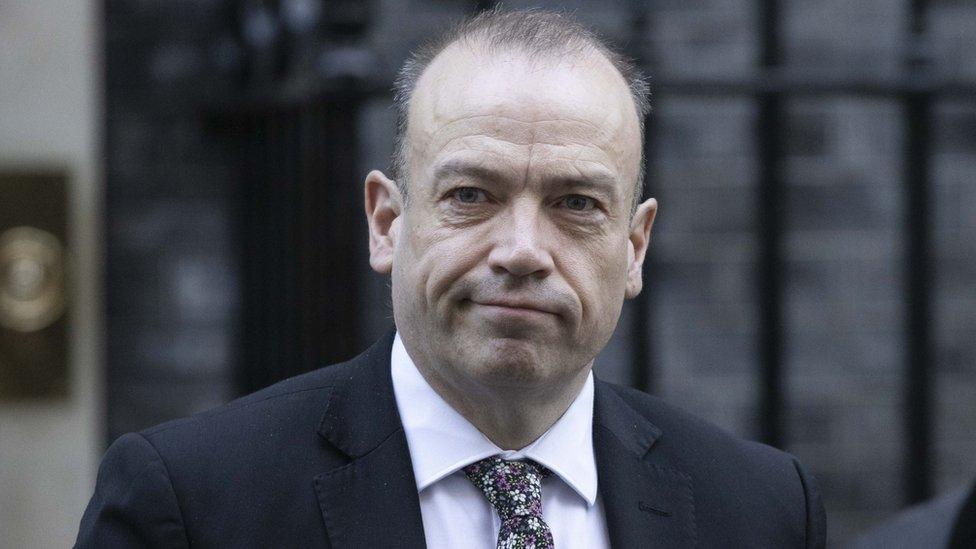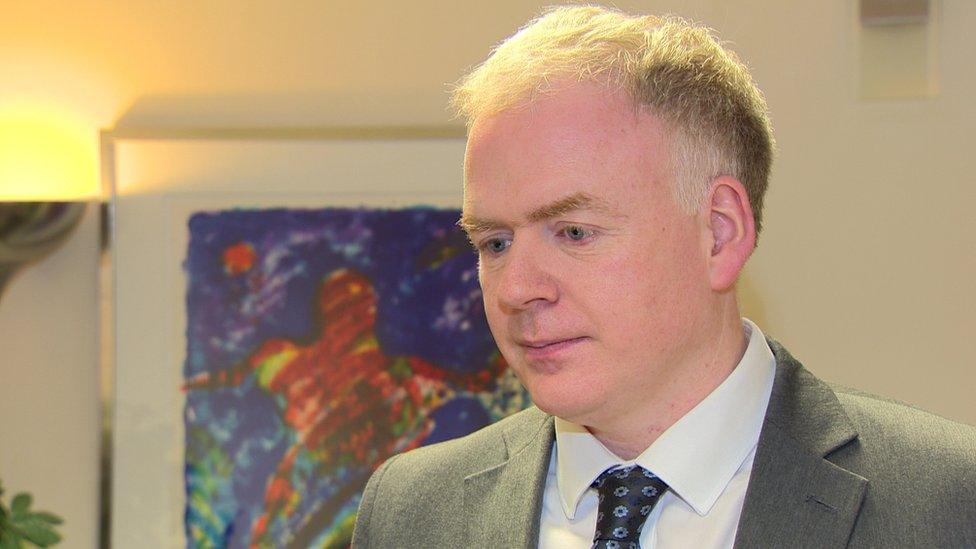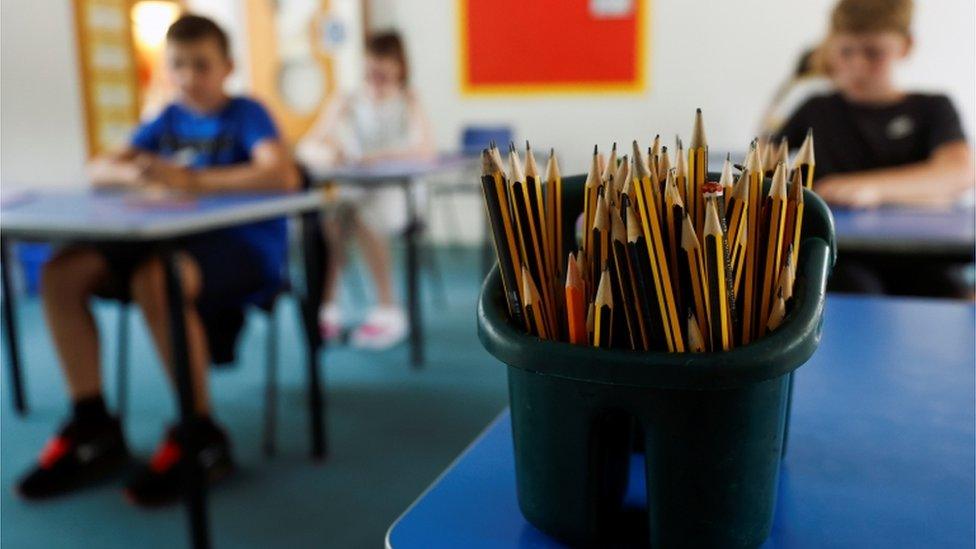NI Education: Basic funding for Northern Ireland schools is cut after budget
- Published

In a letter to schools, the Department of Education (DE) said it "has had to make some very difficult decisions"
The basic funding that schools get in Northern Ireland has been cut following the Stormont budget.
But they are getting some extra money to help with existing staff salary agreements and rising energy costs.
In a letter to schools, the Department of Education (DE) said it "has had to make some very difficult decisions".
The Education Authority (EA) may also need to find about £100m in savings from its block grant in 2022-23, BBC News NI understands.
That could affect services like Special Educational Needs (SEN), school transport, school meals or maintenance.
In delivering a budget for Northern Ireland in November, the Secretary of State Chris Heaton-Harris warned DE that it needed to make significant cuts to its "current spending trajectory".
Mr Heaton-Harris said although education would receive a cash increase of £286m compared to last year's baseline, the department would need to take action to live within its budget.
According to previous analysis by the Institute for Fiscal Studies (IFS), Northern Ireland spends less on each school pupil's education than any other part of the UK.
Jacquie White, General Secretary of the Ulster Teachers' Union, said teachers feared the savings demanded of the EA "could damage the educational landscape here forever".
She said they were "savage" and unions had "been left reeling".
"We've been told that the areas safeguarded within those savings are to include Sure Start, Free School Meals, Extended Schools and School Transport.
"However, no mention has been made of protecting SEN."

Chris Heaton-Harris said that although education would receive a cash increase of £286m compared to last year's baseline, the department would need to take action to live within its budget
The EA, which is responsible to the day-to-day funding of schools and school services, had previously warned it was facing a budget deficit of about £300m in 2022-23.
It had identified rising costs to support pupils with Special Educational Needs and deficits in some school budgets as a particular concern.
Education is Stormont's second biggest spending department behind health.
The bulk of the budget - £1.4bn - goes to schools, while the EA spends over £800m on things like SEN, school transport, school meals and rates.
The department has now written to schools about the 2022-23 budget.
"This is a particularly challenging budget outcome, and, as a result, the department has had to make some very difficult decisions in an effort to deliver a balanced budget this year and to minimise the risk, as far as possible, of a year-end overspend," said the letter from the DE Finance Director Gary Fair.
'Particularly challenging'
Schools were given an initial budget for 2022-23 by the department in March 2022 but their final budget for the year has just been confirmed.
They face a cut of about 0.5% in their basic budget, but will receive extra money to pay specifically for rising energy costs and already agreed incremental pay awards for teaching and non-teaching staff.
Overall £11.8m is being provided to pay for rising energy costs, £22m for pay for non-teaching staff and £15.8m for incremental pay awards for teachers.
That means that overall the amount of money each school will have to spend in 2022-23 will go up by about 3%.
However, inflation is currently about 11% - its highest rate in 40 years.
There is also stalemate over a wider pay deal for teachers to cover the years 2021 to 2023 after unions rejected an earlier offer as "inadequate".
In his letter, Mr Fair said it was a "particularly challenging budget outcome for schools".
"This may require some difficult decisions in the current financial year, and indeed next year which is likely to be equally as challenging," he wrote.
BBC News NI understands that the EA has not yet made any decisions on exactly how it might save money.
In a statement on Monday, an EA spokesperson said that while it welcomed the "additional funding as part of the budget settlement, an EA funding gap for 2022/23 remains with a potentially adverse impact on our schools and front-line services, including but not limited to Special Educational Needs".
It said the "serious funding challenges facing education this year follow 10 years of under-investment in education and ever-increasing demand".

Justin McCamphill, from NASUWT, said the EA had been put in an invidious position
'Education can't take any more cuts'
"The EA does not underestimate the difficulty in trying to achieve a balanced budget, both this year and next, nor the tough decisions that need to be made and the potential impact these may have on our children and young people and our schools," it added.
"The EA will continue to work with DE and the wider education sector in carefully identifying and assessing a range of options to address the pressures faced, whilst trying to minimise the impact, particularly on the services we provide to our most vulnerable and disadvantaged children and young people."
The Irish Congress of Trade Unions- Northern Ireland Commission (NIC-ICTU) said the EA was facing "impossible demands for cuts".
They said unions representing teaching and support staff had "expressed concern that EA management has refused to rule out compulsory redundancies".
Justin McCamphill, NASUWT national official for Northern Ireland, said the DE had "been put in an invidious position by the Westminster government and the secretary of state" and that "education simply cannot endure any more cuts".
Related topics
- Published24 November 2022

- Published10 November 2022

- Published22 October 2021
